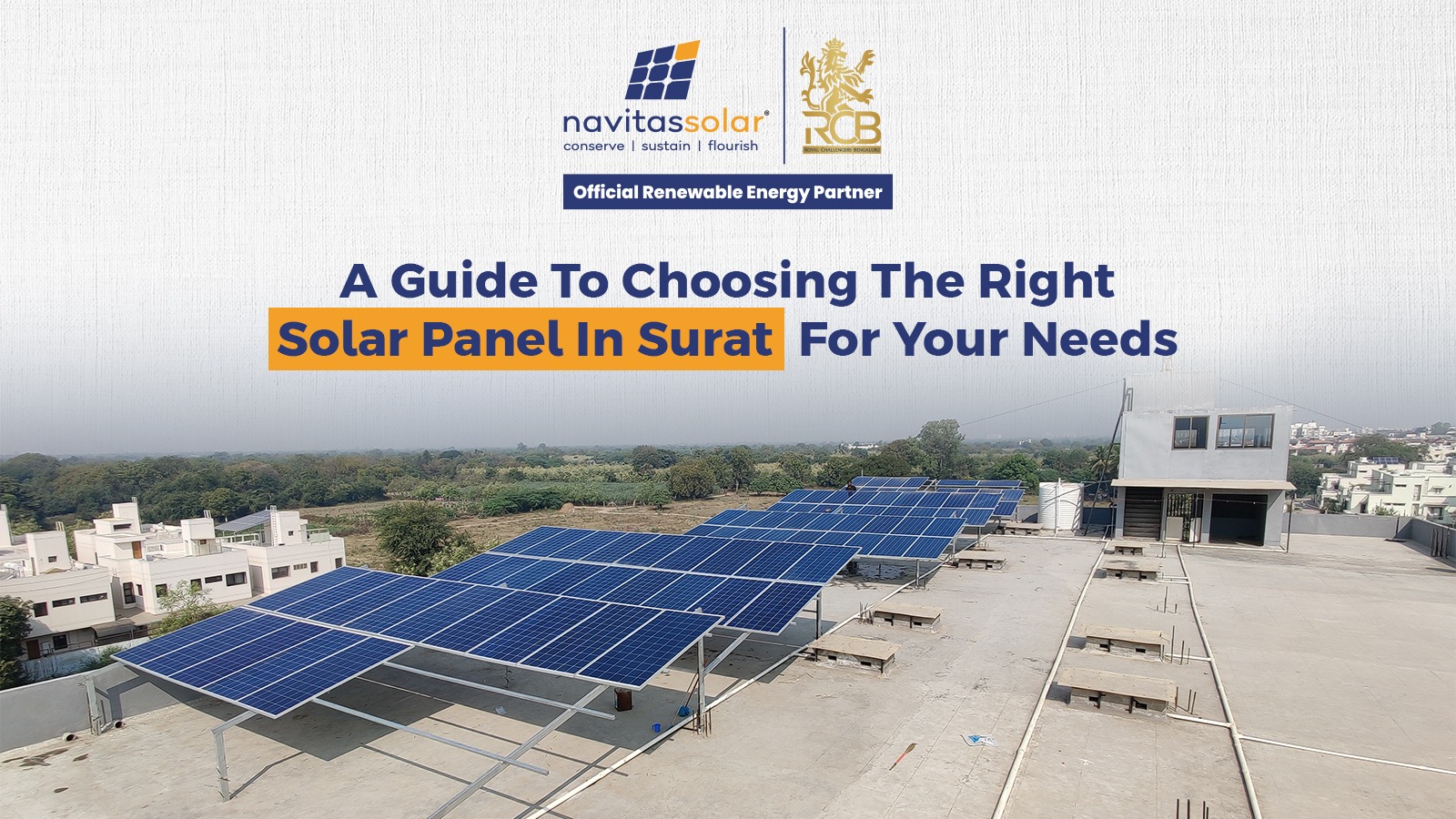A Guide to Choosing the Right Solar Panels in Surat for Your Needs
Do you want to switch to sustainable energy but are confused about which solar system fits your needs? Don’t worry; we are here to ease your decision-making process. This blog discusses everything you need to know before selecting your solar panel in Surat. Hence, you can make an informed decision as to which system suits your needs. As a conscious buyer ready to invest a large sum in solar installation, you must be aware of what you are getting. A solar panel is the most crucial part of the setup and thus requires more attention. Following is the list of things you must consider when looking for solar panels.
How to Choose the Right Solar Panel In Surat
Estimate your voltage requirements:
Solar panels are the units that convert light energy into electricity. The electricity produced is DC, and our appliances use AC. The converter that changes the direct current to alternating current works at a specific wattage. So, choosing the solar panel starts with your voltage requirements. In simpler words, it means understanding how much electricity you use in a month. You can find your watt consumption from your electricity bill or the meter.
Choose the type of solar panel that fits your needs:
A large part of your investment in solar systems comprises solar panels. Without them, there is no use for the solar system. Various types of solar panels differ based on materials and cell structure. The following are the most prominent types of solar panels in India. Many combinations of these basic types are available in the market.
1. Crystalline module solar panel
The crystalline module includes cells made of pure silicon. It is one of the traditional types of solar panels used for many years. It could be a mono-crystalline solar panel or a multi-crystalline solar panel. The mono-crystalline solar panel is made of a single silicon crystal, increasing efficiency and cost. It has a black hue. The multi-crystalline solar panel is made of many silicon crystals, resulting in lower efficiency and cost. It has a blue hue.
2. MONO PERC module solar panel
PERC, or Passivated Emitter and Rear Contact, the solar panel has an extra layer below the cells. This layer in the rear area reflects the light to the cell. This results in more energy conversion, increasing the efficiency of the solar panel. The MONO PERC module panels are of two types: Mono PERC solar panels and Poly PERC solar panels. Mono MONO PERC module has single silicon crystals making them more efficient. The Poly PERC has many silicon layers making them less efficient than Mono PERC solar panels.
3. Bifacial module solar panel
The classic solar panel only has solar cells or PV on one side facing the sun. In the Bifacial solar panel, there are cells on both sides of the panel. Here, one faces the sun with direct exposure and the other absorbs the light reflected from the floor. It is beneficial if you have set up your solar system at height and on a reflective surface.
Understand the Efficiency & Temperature Coefficient:
The efficiency of the solar panel is the electric energy produced per unit of sunlight absorbed. Simply put, it is the watt energy your solar panel produces. Solar panel efficiency comparison is crucial to determine which solar panel fits your needs. A classic solar panel may consist of 60-70 cells producing a certain amount of electric energy. Depending upon the type of cells, this energy production varies. Solar panels may produce different quantities of electricity despite being the same size depending on their cell or PV. Thus, a small panel with more efficiency equals a larger panel with lower efficiency. You can decide your best fit depending on the space available. Temperature coefficient is the percentage decline in electricity produced because of overheating. The solar panels work well at 25°C. However, as the temperature increases, the energy consumption lowers. On average, most solar panels have a temperature coefficient of -0.3% / °C to -0.5% / °C (source). It indicates that on a one-degree temperature increase from the standard 25°C, solar panel efficiency decreases by 0.3% to 0.5%. This loss is not significant. However, you must know to avoid mishaps. Understanding these two is crucial in deciding the number of panels needed. It is also affected by the space you have available for solar panels.
Verify the warranty offered for solar panels:
As a consumer, knowing the eligible warranties is your right and responsibility. In solar panels, there are two warranties that you must compare.
1. Product Warranty
The product or manufacturer’s warranty deals with the hardware of the solar system. It offers a warranty on the solar panels for damage and replacement. On average, you can get a 10-year product warranty on solar panels. However, this may vary depending on the manufacturer.
2. Performance Warranty
Every year, the efficiency of the solar panel decreases by a tiny amount. The performance warranty ensures that this amount is limited. Typically, the performance warranty is available for 25 years. It ensures that for 25 years, the efficiency drops to no less than 80% of the original.
Check for incentives and subsidies on solar panels:
The central government offers Central Financial Assistance (CFA). It is an initiative of the government of India to promote the consumption of solar energy. Additionally, in certain states, the state government also offers subsidies. It can help you reduce your installation cost by 60%. So, ensure that you know all the subsidies you are eligible for before investing directly. Also, there are many company incentives you can avail yourself of. Navitas Solar offers one of the best solar panels in Surat and beyond. We are dedicated solar energy experts eager to help you adopt a sustainable energy alternative. We manufacture a variety of solar panels like multi-crystalline, MONO PERC module, Half cut, Bifacial, TOP-CON and more. Our specialized team will help you design an efficient solar panel system that fits your needs. Let’s connect to conserve resources, decrease emissions, and flourish with nature.
Conclusion
The solar system is dependent on solar panels. You should be careful when selecting a solar panel. First, you need to understand your electricity consumption for a month. It helps you to determine what voltage output your solar panel will need. You need to know what type of solar panel suits you best: multi-crystalline, MONO PERC module, Bifacial, TOP-CON etc. Solar panel efficiency and temperature coefficient will help you determine the size of the solar panel you may need. Compare the product and performance warranty to make your decision. Before finalizing the solar panel, ensure that you have considered all the incentives and subsidies available. Navitas Solar has been a major company for solar panels in Surat and the industry for over a decade. We offer diverse solar panels and help you understand the design and your solar system needs. We intend to help you adopt solar energy with ease
FAQ
1. Is solar panel efficiency comparison necessary?
Yes. Solar panel efficiency is its performance. It helps you determine the number of solar panels you may need to reach the amount sufficient to run your house. It also helps determine the budget for adapting the solar system. Determining which company’s solar panel is worth your investment is crucial.
2. Are panel efficiency and temperature coefficient the same?
No. Solar panel efficiency is the electricity produced by solar panels under sunlight. Temperature coefficient is the decrease in electricity produced due to exposure to more heat.
3. How much does a solar panel cost in Surat?
The solar panel cost in Surat or any place depends on various factors. The primary one is the type of solar panels and their efficiency. Depending on these, the number of solar panels you need will change. Government subsidies and company incentives also influence the cost of solar panels. Navitas Solar offers one of the best quality solar panels at a lucrative price. Let’s connect and discuss more.


 Online | Privacy policy
Online | Privacy policy
Related Posts
You May Also Like
Bonito Series: Driving Innovation in…
Read MoreTOPCon Series: The Next Generation…
Read MoreValuable Points to Remember During…
Read MoreNavitas Planet Partners with Hysolwin…
Read MoreDriving Towards a Sustainable Future:…
Read MoreWhy Do Top-Grade EVA Sheets…
Read MoreBonito Series: Driving Innovation in…
Read MoreTOPCon Series: The Next Generation…
Read MoreValuable Points to Remember During…
Read MoreNavitas Planet Partners with Hysolwin…
Read MoreDriving Towards a Sustainable Future:…
Read MoreWhy Do Top-Grade EVA Sheets…
Read MoreBonito Series: Driving Innovation in…
Read MoreTOPCon Series: The Next Generation…
Read MoreValuable Points to Remember During…
Read MoreNavitas Planet Partners with Hysolwin…
Read More